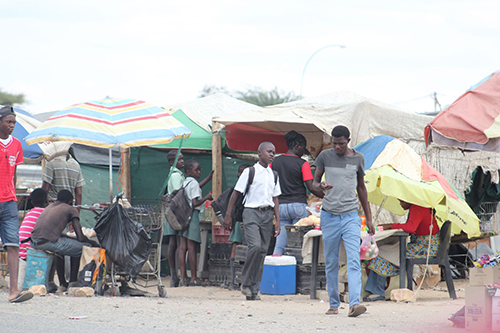Edgar Brandt
Increasing commodity prices in fuel, electricity, food and transport, without any hope of salary increases for most, is grinding down the spending power of ordinary Namibians.
This, a local economist has warned, will push many more into poverty, thereby diminishing overall economic activity and prolonging hopes of a speedy economic recovery.
Most Namibian businesses cannot afford to implement salary increases due to the adverse effects of Covid-19, combined with slower economic activity. This in the face of increasing global prices, caused by disrupted supply lines.
As a result, the International Monetary Fund expects elevated global inflation for the foreseeable future, with emerging market and developing economies expected to be hit with at least 5.9% this year.
“The increasing commodity prices will further erode the purchasing power of the meagre incomes of ordinary Namibians. This will push more citizens into poverty and increase the economic hardship that they are already experiencing,” warned Mally Likukela, a local economist and managing director of Twilight Capital.
He said given government’s depleted fiscal space, civil servants also have to make peace with the fact that there will be no salary increase to alleviate the burden of Covid-19.
“Those who are dependent on social safety nets will be severely hit because the real value of their grants will plummet much quicker. The overall impact will be a significant reduction in aggregate demand in the entire economy - hence diminishing further any hopes of recovery, going forward,” Likukela cautioned. Despite some respite in fuel price increases for January this year, global oil prices are still at a seven-year high, and this has resulted in the first fuel increase for 2022. This was confirmed for Wednesday, 2 February when diesel will increase by 40 cents a litre and petrol by 30 cents, bringing the new fuel prices in Walvis Bay to historical Namibian highs of N$15.95 per litre for petrol and N$15.98 per litre for diesel.
According to the mines and energy ministry, international oil prices sharply pushed upwards during the first month of 2022 due to interconnected factors. These factors include the Organisation of Petroleum Exporting Countries (OPEC) continuing to keep oil supply at a low level, and oil producers finding it hard to attract investments for new projects. This is as more investment funds are getting diverted towards renewable energy projects.
Impact
The impact has been that international oil prices increased with unleaded petrol 95 prices during January 2022 being at US$95.142 per barrel, compared to US$86.331 per barrel for December 2021.
“Moreover, the increase of over US$10 per barrel in a short period of time signifies a high instability of the global oil market. These increases have unfortunately led to an increase in the import parity price of petroleum products to Namibian shores,” read a statement from the energy ministry. However, the ministry assured the public that it is fully aware of inflationary pressure that fuel price increases put on prices of other goods and services in the economy.
“Nevertheless, under these difficult circumstances that are only partially within the control of the ministry, the public is informed that the best decision possible has been taken,” the ministry added.
Meanwhile, market analysts estimate that OPEC still has a shortfall of four million barrels before reaching “normal” supply, estimating that the process could take until the end of 2022 or early 2023 to normalise, implying that oil prices could remain elevated throughout 2022.
Moreover, on the electricity front, the Northern Regional Electricity Distributor (Nored) confirmed a tariff increase of 3.3% that will come into effect tomorrow, 1 February. In a press release, Nored noted that it “is fully aware of the current economic situation and the impact of electricity costs on our customers. However, the tariffs adjustment is granted to ensure a continued supply and distribution of a reliable, affordable and high-quality electricity supply to our customers during these challenging times”.
In terms of inflationary pressure, Namibians are dealing with annual inflation that climbed to 4,5% in December 2021, from 4,1% in November 2021. According to analysts, local prices are being pushed up by supply-side factors, leading to higher prices of particularly imported merchandise and oil. In an Economic Outlook 2022 report, local stock brokerage Simonis Storm highlighted shortages in various product markets which they expect to exert further inflationary pressures on food and general imports in 2022. According to the brokerage, the biggest drivers of local inflation remain transport (43.4%), food and non-alcoholic beverages (21,1%) and alcoholic beverages and tobacco (11,7%). Other noticeable inflationary contributors were water, electricity, gas, furnishings and household equipment.
“General transport costs, except air travel, increased by 14.3% year-on-year (y/y) in December 2021. Operating costs of vehicles increased by 19.7% y/y in December 2021 in general. These include prices of petrol/diesel which rose 36.1% y/y, driving licences which rose 5.8% y/y and spare parts as well as service and repair charges which went up 4.8% y/y” Simonis Storm stated. ebrandt@nepc.com.na


